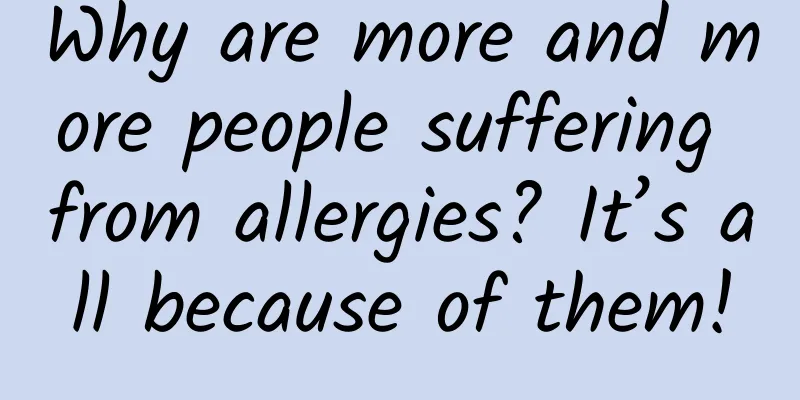Why are more and more people suffering from allergies? It’s all because of them!

|
Why do I suddenly have allergies when I was fine before? Pollen allergies have become a hot topic recently, with some netizens asking, "I didn't have allergies before, why do I suddenly have allergies now?" "Is there too much pollen now?" Stills from Love Apartment We used to be able to eat shrimps and crabs and smell flowers without any pressure, but now we have itchy skin and sneezing all the time? What exactly makes our immune system "rebel"? If we want to know why we suddenly have allergies, we need to understand allergies first. 01What causes allergies? Allergies are essentially an overreaction of the body's immune system to certain substances. Normally, the immune system recognizes and fights off harmful foreign substances, but in an allergic reaction, it attacks normally harmless substances, such as pollen and dust mites. Allergies manifest in various forms and their severity varies from person to person. They may appear as skin itching, erythema, wheals, or respiratory symptoms such as sneezing, runny nose, and coughing. In severe cases, there may even be life-threatening symptoms such as difficulty breathing and anaphylactic shock. Common types of allergies include environmental allergies, food allergies, and drug allergies. The onset of environmental allergies is often related to contact with allergens in the environment and has seasonal or regional characteristics. Food allergies cause symptoms to appear within a short period of time after eating certain foods, and the symptoms can affect multiple systems. The timing and severity of drug allergy symptoms vary by drug and by individual. 02Allergies are affected by these factors The causes of allergic diseases are complex. The following factors can be used to analyze why allergies suddenly occur: Changes in the immune system Ageing or changes in health can affect the immune system and cause allergies. For example, changes in endocrine and hormone levels, as well as certain diseases, can put the body's immune system in a state of stress, causing dysfunction and making it more likely to have allergic reactions to certain substances. Genetic factors Genetics plays an important role in the formation of allergic constitution. If both parents have allergic constitution, the probability of the child inheriting allergic constitution is relatively high; if only one parent has allergic constitution, the child also has a certain probability of inheriting it. Environmental factors When the living environment changes, you may be exposed to different allergens, increasing the risk of allergies. People who are not allergic to allergies may also develop allergies if they are exposed to an environment with high allergen concentrations for a long time. Global warming will have an impact on allergens. It changes the growth cycle and distribution of plants, causing allergens such as pollen to spread more widely and for longer periods of time. In addition, as air pollution increases during urban evolution, exposure to more chemicals may also increase the risk of allergies. lifestyle Changes in lifestyle may trigger allergies. Some people suddenly consume a large amount of a certain food at a certain stage. Long-term excessive intake may cause the immune system to overreact to the food. In addition, excessive cleaning will cause the immune system to lack contact with some microorganisms, resulting in its function not being fully exercised. When the immune system encounters foreign substances, it is easy to overreact, thus causing allergies. Psychological and physical stress Long-term exposure to excessive psychological and physical stress, coupled with emotional states such as mental tension, anxiety, and depression, may affect the function of the immune system and induce allergic reactions. 03Treatment Tips To treat allergies, we can avoid contact with allergens, take medication, adjust diet and daily routine, etc. In addition to these, desensitization treatment can also be carried out under the advice of a doctor. It should be noted that desensitization treatment is not suitable for everyone. Patients with severe cardiovascular diseases, autoimmune diseases, malignant tumors and other diseases, pregnant and lactating women, and patients who are taking drugs that may affect the safety of desensitization treatment are not suitable for this treatment. Audit expert: Peng Guoqiu Deputy Chief Physician, Fourth Medical Center, PLA General Hospital |
<<: Stomach pain ≠ gastritis! These symptoms may be early signs of gastric cancer
>>: What exactly does the “zero additives” on food packaging mean?
Recommend
The best time of the month to enlarge breasts
"Big breasts and round buttocks" can be...
What is the reason for slow opening of fingers?
It is very common for women to feel very painful ...
What is invasive breast cancer
In recent years, the number of people suffering f...
How many days after menstruation is it easier to get pregnant?
Sisters all know that normal women of childbearin...
Super practical: During the Yangkang recovery period, you must pay attention to these 10 points!
Source: People's Daily The cover image and th...
Draftfcb: Location-triggered advertising ShopAlerts case study effect sharing
AT&T and location service provider Placecast ...
What to do if there are lumps under the armpits during breastfeeding
For women, the older they get, the more they shou...
Abdominal pain 4 months after delivery
We may experience this or that discomfort after c...
What are the symptoms of cervicitis?
Various gynecological diseases require female fri...
White discharge from the nipple
Under normal circumstances, women's breasts d...
Signs of menstruation coming soon during lactation
After giving birth, women will have a period of u...
Will the ovarian follicles turn into cysts if they are not released?
When they reach childbearing age and feel that al...
What are the best snacks for pregnant women?
Pregnant mothers should pay special attention to ...
What does it mean when a woman doesn’t reply to your message?
We all know that in the process of communication ...
How to treat female sexual frigidity?
Many people suffer from sexual frigidity. Althoug...









